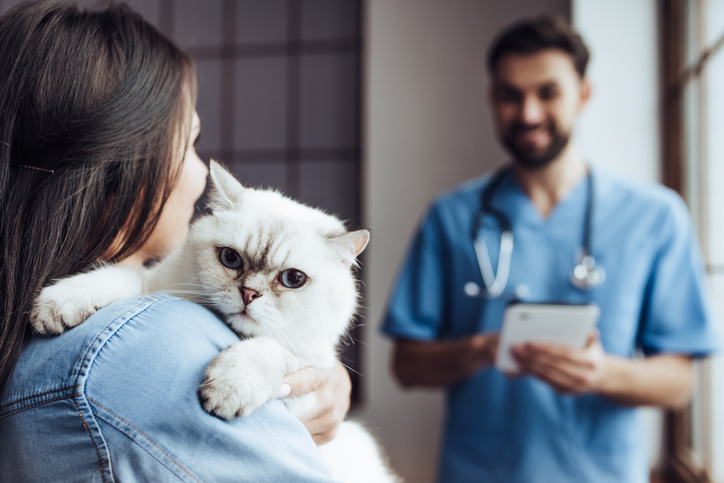How to find a lost cat
7th January, 2020

A missing cat means a great deal of worry and heartache. You may have recently moved: many kitties become anxious and run away when uprooted, forgetting their way back to your new home. Your cat may have been injured or faced a medical complication.
There are straightforward ways to increase your chance of a hasty reunion – remaining calm and looking in logical places is a good place to start.
A microchip is a permanent means of identifying your moggy, so if your kitty is found and scanned, you could be in luck.
Securing dependable pet insurance is just as important as microchipping your cat – you never know when illness or injury might occur, and vet bills can quickly reach eye-watering heights.
Purely Pets offers, enabling you to give your feline the best possible quality of life.
We know how gut wrenching a pet going missing can be, so we’ve created a guide to help reunite you and your lost cat as soon as possible.
Where should I look when my cat goes missing?
Felines are naturally curious creatures, often opting to kip in odd locations, so first check every nook and cranny of your home and garden.
Knock on neighbours’ doors, politely asking them to look inside their cars, garages, sheds and homes – kitties have been known to settle into strangers’ households!
Contact local rescue centres and veterinary clinics, asking if they’ve encountered your feline – a kind stranger may have taken your pet there for treatment.
You can also look for your missing pal online. Scan lost-and-found websites linked to your area and add your kitty’s details to UK-based lost pet databases.

What else can I do to find my missing cat?
Inform the microchip database your cat is registered on right away – they can add this information to your feline’s digital record, so it will be flagged when they’re found.
Create ‘missing’ posters that feature a clear photo and description of your cat, including details of any medical conditions, their age, and your contact information.
Place these lost cat posters all around your local area and ask local shops to display them as well.
Why should I microchip my cat?
Cats are explorers, climbing and roaming all around the neighbourhood if they’re outdoor kitties. Even if you have an indoor pussycat, they might slip past you one day, heading out into the big, wide world.
Classic collars and an ID tag aren’t enough when it comes to pet identification: they can easily fall off and get lost, and if they get caught on something, they can actually put your cat’s life at risk.
In comparison, a microchip is a permanent and safe means of identifying your pussycat, should they go missing – it will also come in handy if ownership disputes ever arise.
According to Blue Cross, many cats are brought to local shelters by people who believe they are strays. If your cat isn’t microchipped, you may never be reunited.
A microchip acts as a digital link between you and your puss, significantly increasing the likelihood of a fast reunion. Each microchip has a unique code, which is kept on a national database.
Along with the code, your contact details are also stored – whenever you move to a new house, you’ll need to record the change of address on the database.
As long as you keep these details up to date, if your cat goes missing and their microchip is scanned, they should be home, curled up next to you, in no time.

At what age can cats be microchipped?
Purina states that kittens can be microchipped at any age. The procedure is usually carried out at the same time as their first round of vaccinations, or during neutering.
Any local animal shelter or reputable breeder will have kittens and cats microchipped before letting them outdoors.
Whether you buy your kitty from a breeder or adopt your furball from a rescue centre, make sure the details linked to their microchip are updated to yours – you can do this by getting in contact with the database that your kitty’s microchip is registered on.
If you intend to travel abroad with your cat, it’s vital to have them microchipped beforehand. In fact, some countries legally require this.
Will a microchip cause my cat pain?
Only certified vets or trained staff at animal welfare centres should implant microchips.
Once you’ve had a consultation, the microchip will be inserted beneath the skin, placed between your mog’s shoulder blades.
A microchip is tiny – around the same size as a single grain of rice – so, once it’s inserted, your pussycat won’t have a clue it’s there.
The implantation procedure doesn’t take long and will hurt no more than an injection would. In most cases, the microchip stays in position for life.
How can I improve my cat’s safety?

So, what else can you do to keep your cat safe?
There are plenty of pet-friendly GPS collars available online, which can easily be attached to your cat’s collar.
This is particularly useful for elderly cats and rescue kitties, as they may become panicked or disorientated in new locations.
These clever collars allow owners to watch a live feed of their feline’s real-time location – all from an app on their smartphones.
While trackers such as these could fall off, they’re still a useful way to get to know your cat’s habits and daily movements.
In the event your kitty goes missing, you’ll have a better idea of where to look for them, as you’ll be familiar with their favourite haunts.
You can also:
-
Get specialist pet insurance
-
Keep details related to your cat’s microchip current
-
Consider securing older or anxious kitties indoors
-
Encourage neighbours to get to know your kitty
Protecting your cat
Purely Pets understands how much your kitty means to you.
We offer reliable pet insurance that covers them if they get sick or injured. Our policies can be tailored to your specific needs and budget – specialist protection doesn’t have to break the bank.
Keep your cat safe and get a quote today.
Frequently asked questions
What are the chances of finding my lost cat?
Losing a beloved pet can be a heartbreaking experience, and it's natural to wonder what the chances are of finding your lost cat. While every situation is unique, there are some factors that can influence the likelihood of you finding a lost cat and successful reunion:
Take immediate action: The sooner you start searching for your cat, the higher the chances are of finding them. This means putting up flyers in your neighbourhood, contacting local animal shelters, and using social media platforms to spread the word.
Enlist the help of friends, family, and even neighbours: Cats are known to hide in nearby areas when they're scared or disoriented, so it's important to thoroughly search your immediate surroundings.
However, it's important to be realistic and understand that there is no guarantee of finding your lost cat. It's possible that they may have wandered too far or have been taken in by someone else. But even in the face of uncertainty, it's important to stay positive and never give up hope.
Can cats find their way home if lost?
Cats are known for their incredible sense of direction and their ability to navigate unfamiliar territories with ease. Many pet parents have witnessed their feline friends disappearing for days, only to find them back at home as if nothing happened.
So, can cats find their way home if lost? The answer is a resounding yes. Cats have a remarkable instinctual homing ability that allows them to find their way back to familiar surroundings, even if they are miles away from home.
One of the main reasons behind most cats' ability to find their way home is their acute sense of smell. Cats have a highly developed olfactory system that allows them to detect scents from long distances.
They can remember the scent of their home and use it as a guide to navigate their way back. This is why it's important for cat owners to keep a piece of clothing or bedding with their scent in case their furry friend gets lost.
Another factor that contributes to cats' homing ability is their exceptional memory. Cats have an impressive spatial memory that enables them to remember the layout of their surroundings, including the route back home. They create mental maps of their territory and use landmarks and familiar scents to navigate. This internal GPS system helps them find their way back even in unfamiliar territories.
Helpful Pages
Recent Posts
Pet Insurance Quote
- 98% claims paid *
- Claims paid directly to vets
- 24/7 vet video consultations
- Interest free monthly payments




